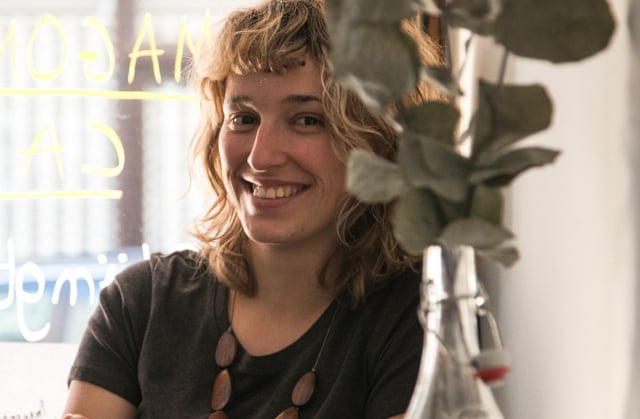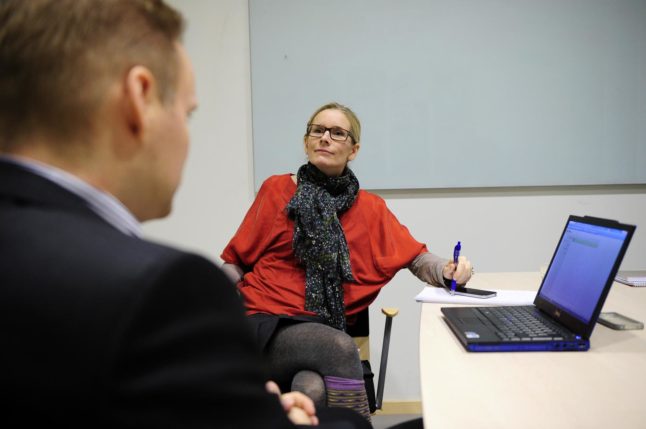This article is available to Members of The Local. Read more about membership here.
Mialhe is the founder of Sacrebleu, which organizes French language cultural events and film screenings for francophones or francophiles in Stockholm, catering to both adults and kids.
Since relocating to the Swedish capital she has made sure to stay in touch with her homeland and native language, starting by teaching French in Stockholm's Saltsjöbaden, but it quickly became apparent that there were also bigger ideas that needed to be realized.
“I soon realized I had ideas for doing more than teaching grammar. I had been speaking with a lot of international parents who were a bit sad about not having enough fun with French for their kids. French is so cool – there's so much amazing French rap music, or French Youtube content, and those kids weren't getting that,” she recalls.
Mialhe decided that as no one else was making that side of French language culture accessible in Stockholm, she should be the one to do it. The entrepreneur is particularly passionate about giving a new generation of international kids access to a part of their culture which they are missing out on by being abroad.
“French rap for example is to me like poetry with rage. There's so much amazing stuff kids shouldn't miss, and a certain generation of young people here won't find out about it. So I wanted to bring all that amazingly cool stuff to them, to kids who miss that part of French culture.”
In the beginning it was a small endeavour, testing the water with small-scale screenings to see how people reacted. A nervy experience, but the feedback was good.
“I started with adults in Saltsjöbaden, then I moved on to barnfika for kids, which is a way for people to have a French moment with their kids. And French not just in the sense of the language, but French animators and directors.”
“It was so cool to be doing it, organising these screenings, which is something I really wanted to do. But I was also very stressed because I really wanted to be able to pull it off. So I thought, if five people come, great. Then in the end four times as many came. With the first one I was so sure no one would come. My boyfriend – who I have to thank, he's the best – told be it would be OK. He was right,” she laughs.

Photo: Sacrebleu!
By the time its first six months of its existence were over, Sacreblue had held 12 events. Along with barn fika and film screenings, Mialhe made sure to highlight another form she is particularly enthusiastic about: French language Youtube content.
“I want to show them the best stuff, in France we have so much Youtube content – history, biology, so much,” she notes. “And I'm hopefully going to work with a Swedish university to produce things in that area for young people learning French. If that happens I'll translate some Youtube stuff, because there's so much that's really good and funny.”
READ ALSO: Sweden is perfect fit for French fashionista
Though Mialhe loves French Youtube content, the gold standard is in her opinion a Swede: PewDiePie. Aware that he can be a divisive figure, she explains her admiration for the 28-year-old.
“He represents exactly what the possibilities with Youtube are. He has clickbaity titles, but he's actually making fun of the spirit of Youtube itself, in a self-aware way. Nothing is left to chance.”
“He's very smart. After watching too much content on Youtube, you can see the way he uses the trashy tropes of Youtubing in a deliberate way. He makes it awkward on purpose. For me it's smart to follow how he does things. He knows everything there is to know about how to use Youtube.”
Sacreblue is continuously evolving, and a recent development is the addition of workshops:
“In February I'll start a partnership with creative workshop Ateljé 4. So we start with a movie, then there's a workshop afterwards – it's a nice way to have fun with French and France that's not just grammar”.

Photo: Sacrebleu!
When The Local asks what her favourite of the events so far has been, the Sacrebleu creator has two particularly fond memories.
“The French Christmas party we did was great, so many people showed up, it was crazy. That was the first time I'd done anything in a partnership and it was amazing. Then the event I put on earlier in January showing films – a lot of people came and asked me to keep putting those things on, saying for example 'I get the same feeling as I did when I went to see films with my parents as a kid'. That's so inspiring – it's the best thing you can hear.”
READ ALSO: 'I saw a glaring gap and set up my own 3D printing business'
Looking to the future, Mialhe has a very clear idea about what her dream achievement with Sacrebleu would be: to create a one stop shop where people interested in French language culture can come and engage with it.
“The dream? To have a big building in Stockholm where we could have a French institute, a space to screen films, hold events, a library, a place you can play French videogames, a cafe, and a shop where startups from France could have popups for a month,” she reveals.
“If I could do that, have a French cultural space for people, where can show that there's also this young, living side to French culture, that would be incredible.”

Photo: Sacrebleu!
And reflecting on her time in Stockholm so far, Mialhe highlights the way the Swedish capital has given her a sense of freedom to pursue her ideas.
“I always think if you have an idea, you should do it. Worst case scenario it doesn't work. We've probably all worked in jobs we didn't like, couldn't focus on because we weren't into it. But in Paris it's not so easy to dream – you end up in those jobs, feeling stuck. Here in Stockholm, I feel more free – no one judges you, and you can do whatever you want.”
“Thinking that you would have changed the world if you'd only tried it is a much worse feeling than actually doing what you want to do, then seeing if it works or not. You have to just do it,” she concludes.



 Please whitelist us to continue reading.
Please whitelist us to continue reading.